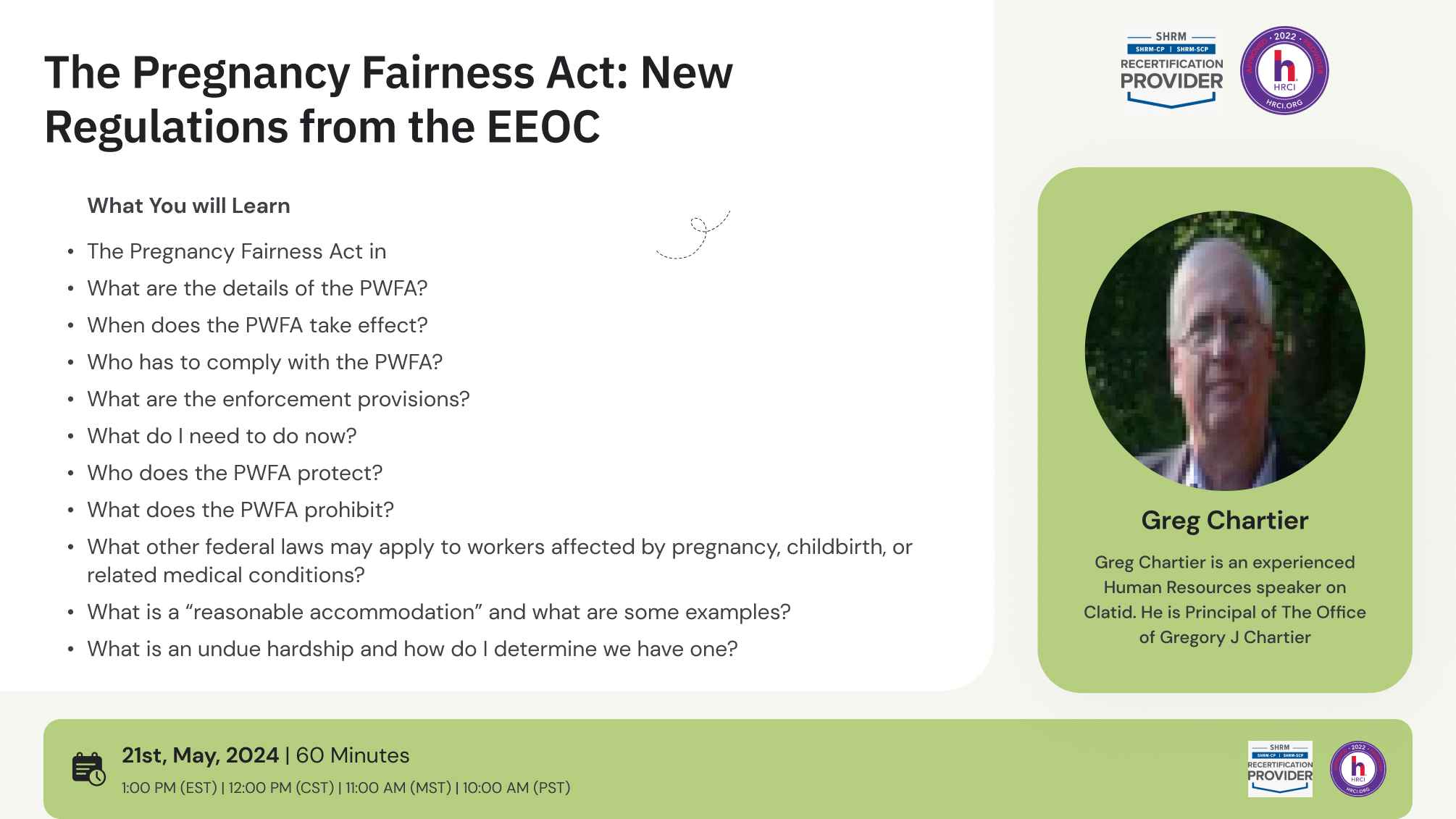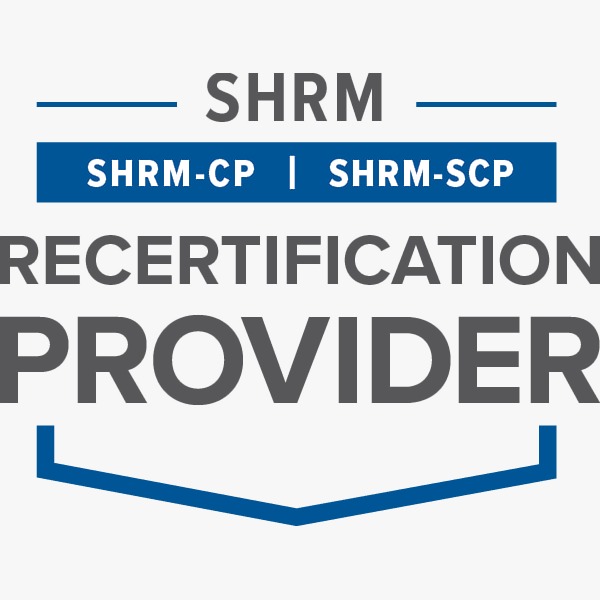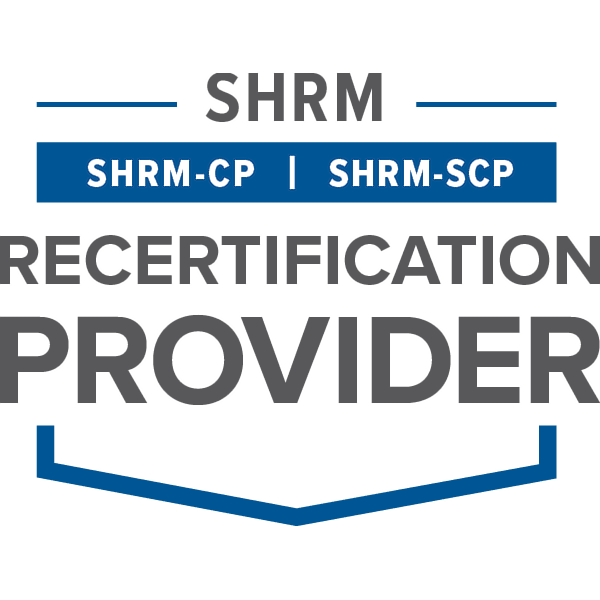- Topics
- Webinars
- Products & Services
- Customer Help
- Resources



The Pregnant Workers Fairness Act (PWFA) requires a covered employer to provide a “reasonable accommodation” to a qualified employee’s or applicant’s known limitations related to, affected by, or arising out of pregnancy, childbirth, or related medical conditions, unless the accommodation will cause the employer an “undue hardship.”
The PWFA applies only to accommodations. Other laws that the EEOC enforces make it illegal to fire or otherwise discriminate against employees or applicants on the basis of pregnancy, childbirth, or related medical conditions.
The PWFA does not replace federal, state, or local laws that are more protective of workers (used here to mean job applicants and employees) affected by pregnancy, childbirth, or related medical conditions. More than 30 states and cities have laws that require employers to provide accommodations for pregnant workers.
- The Pregnancy Fairness Act in 2024
- What are the details of the PWFA?
- When does the PWFA take effect?
- Who has to comply with the PWFA?
- What are the enforcement provisions?
- What do I need to do now?
- Who does the PWFA protect?
- What does the PWFA prohibit?
- What other federal laws may apply to workers affected by pregnancy, childbirth, or related medical conditions?
- What is a “reasonable accommodation” and what are some examples?
- What is an undue hardship and how do I determine we have one?
- How do I handle a reasonable accommodation request?
Nearly 85 percent of women will become mothers during their working lives. And yet discrimination against pregnant workers is incredibly common, showing up in both well-paid law-firm and Wall Street jobs and service-sector work like fast food and retail. Pregnant workers, particularly those in low-wage industries, often need some sort of modification to their jobs so they can keep working while protecting their health and the health of their pregnancies; before the PWFA was passed, such requests were often denied. Many people were simply fired instead of given simple accommodations.
The PWFA ensures that an employer almost always will have to grant some straightforward modifications, such as the ability to sit or stand while at work, carry a water bottle, and take more restroom breaks. Workers can also request things like better-fitting uniforms and light duty assignments. But it also has other requirements that are more far-reaching. In a country in which only 27 percent of Americans get paid family leave, the PWFA opens up a brand-new avenue for workers to secure time off for pregnancy related needs—both before giving birth and afterward—without risking their jobs.
The PWFA also interacts and actually conflicts with other federal civil rights legislation. Join us to learn the details of the PWFA, as employers must determine how to comply with the law and how to connect it to other pieces of legislation that they are obligated to enforce.
- All Employers
- Compliance professionals
- Risk management professionals
- HR professionals
- Anyone interested in learning about the PWFA

Greg Chartier is an experienced Human Resources speaker on Clatid. He is Principal of The Office of Gregory J Chartier, and is a well-known management consultant, educator and speaker and author of the recently published What Law Did You Break Today? His practice is based on the Business Partner Model of Human Resources, which emphasizes on outsourcing, the use of technology to gain efficiencies and the improvement of managerial skills.
Greg is a thought-provoking professional speaker and his wisdom and insights into management and leadership make him an electrifying speaker and seminar leader. His seminars are customized to reinforce company mission, vision, values and culture and the content is practical for team leaders, managers, supervisors and executives. His philosophy is simple: management is a skill and you can be a better manager by developing your skills.
He has a bachelor's Degree from The Citadel, the Military College of South Carolina, an MBA from Rensselaer Polytechnic Institute and his Ph.D. in Human Resources Management from Madison University. Greg is certified by the Society for Human Resources Management (SHRM) as a Senior Professional in Human Resources (SCP) and as both a Senior Professional and a Global Professional in Human Resources (SPHR and GPHR) by HRCI, the Human Resource Certification Institute.
He is a former Board Member of the Business Council of Westchester, where he was the Chair of the Human Resources Council and a member of the Executive Committee. Greg is a national member of SHRM and a local SHRM chapter, the Westchester Human Resources Management Association. He was also a member of the Board of the Child Care Council of Westchester.
Greg is involved in the Certification Program for Human Resources Management at Pace University, which includes the preparatory program for the Human Resources Professional Examinations and the Essentials in Human Resources Management Program, as well as the Continuing Education Programs including HRCI and SHRM recertification. He is also a member of the faculty of the New York Medical College in Valhalla, NY.

SHRM -
Clatid is recognized by SHRM to offer Professional Development Credits (PDCs) for the SHRM-CPSM or SHRM-SCPSM. This program is valid for 1.0 PDCs for the SHRM-CPSM or SHRM-SCPSM. For more information about certification or recertification, please visit - portal.shrm.org.

HRCI -
This webinar has been approved for 1.0 HR (General) re-certification credit hours toward California, GPHR, HRBP, HRMP, PHR, and SPHR recertification through the HR Certification Institute.
The use of this seal is not an endorsement by the HR Certification Institute of the quality of the activity. It means that this activity has met the HR Certification Institute’s criteria to be pre-approved for re-certification credit.
Sign up now on clatid.io. Visit clatid.io/webinar to discover a wide range of webinars from industry specialists. Tick on either ‘live webinar’ or ‘on-demand’, and simply click on ‘buy now’ to get enrolled.
You can refer Clatid to anyone in your social circle. Explore your industry with your colleagues by getting them signed up on clatid.io today!
Go for the topic of your keen interest on clatid.io. Tick on ‘live webinar’ and get enrolled! Easy registration, transparent transaction.
You can request for an on-demand webinar that records the live webinar for you. After the webinar ends, you will have full access to the webinar’s recording. You can also explore Clatid offline to order your webinar DVDs, flash drives and transcripts.
If you can’t attend the live webinar, simply go for the ‘on-demand webinar’ for the same price! Now, the live webinar recording will be saved in a cloud storage for you to access anytime from anywhere.
Clatid offers both hard and soft copies of the webinars. It contains all the highlights as well as comprehensive descriptions of the webinar, so you never miss out a single detail.
After attending the live webinar, your certificate will be emailed to you. You can download it and add more charm to your professional score.
At the end of each webinar, you have the opportunity to interact with your industry experts, where you will get answers to all your queries.
Can’t attend the live webinar? Clatid has got you covered! You can always switch to the on-demand webinar from your portal. You can also get your hands on the webinar’s DVD/flash drive and transcript. So order them now!
Clatid brings a variety of options for offline learning. Order your DVDs, flash drives or transcripts now to have a lifetime access to Clatid webinars. You can also go for on-demand recordings. Download and watch it anytime from anywhere in the world!


